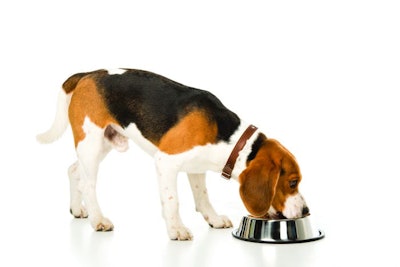
Dog owners may be reticent to try a different brand of food, fearing gastrointestinal troubles for their dogs and carpets. Knowing how long to expect for the transition could allay those fears. Common guidance holds that dogs should transition to new foods over a week or more, but scientists hadn’t published research to confirm that convention. For those scientists, researchers need to know when a dog’s gut will be ready for observation after switching to an experimental formulation.
“As long as I've been doing animal nutrition research, we’ve argued over how long we need to feed a new diet before collecting samples, when everything's stabilized,” Kelly Swanson, professor of animal sciences at the University of Illinois – Urbana-Champaign. “No one has ever tested it definitively.”
It turns out, one week may be all it takes for a turn-over of bacteria and other organisms in dogs’ intestines. Swanson collaborated with scientists working for direct-to-consumer pet food company Nom Nom, a subsidiary of Mars Pet Care. The research team conducted an experiment to test how long it took for dogs’ gut microbiome changes to stabilize following a diet change. The journal Animal Microbiome published their results.
Timeline for microbiome change after dog food change
In the experiment, 12 healthy adult Beagles ate the same nutritionally balanced kibble for two weeks. After two weeks, the scientists fed one group of dogs a protein-rich canned diet, while another group of dogs ate their kibble with a high fiber supplement. As those two groups digested their differing diets, the researchers collected their feces. Analysis of the microbes and chemicals in that excrement revealed changes in the dog’s internal community of microorganisms. Within two days, the chemical leftovers of microbes biological processes, or metabolites, showed changes and then stabilized. By six days, the microbes appearing in the stool samples too had stabilized with both supplemented diets. The scientists then replicated the experiment, switching the dogs’ groups, and found similar results.
“Metabolites change really quickly, within a couple days,” Swanson said. “Bacteria responsively metabolize and deal with the substrates they're given in the new diet. Then it takes a few more days to sort out the microbial pecking order, if you will. Our data show everything stabilizes by day six, so animal nutrition researchers could confidently sample and find a stable microbiome within 10 days.”
“People usually suggest moving pets over to a new diet over a seven-day period,” he said. “Our study suggests the microbes can completely change over in that timeframe. When you switch diets, the body has to adjust, but the microbes have to change as well. If they’re not in a happy situation, you end up with loose stools or flatulence. So it’s probably good to do it a bit more gradually at home than we did in the lab.”

















